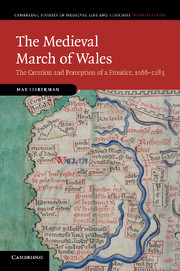Book contents
- Frontmatter
- Contents
- List of maps
- List of tables and illustration
- Preface
- List of abbreviations
- INTRODUCTION
- 1 A BORDER REGION?
- 2 THE MAKING OF A BORDER ARISTOCRACY
- 3 WARFARE AND DIPLOMACY
- 4 THE EXTENT AND NATURE OF THE MILITARY FRONTIER
- 5 THE MILITARIZATION OF SOCIETY
- 6 THE SHAPING OF ADMINISTRATIVE TERRITORIES
- 7 THE BORDER LORDSHIPS AND THE ENGLISH STATE
- CONCLUSION
- Select bibliography
- Index
3 - WARFARE AND DIPLOMACY
Published online by Cambridge University Press: 06 July 2010
- Frontmatter
- Contents
- List of maps
- List of tables and illustration
- Preface
- List of abbreviations
- INTRODUCTION
- 1 A BORDER REGION?
- 2 THE MAKING OF A BORDER ARISTOCRACY
- 3 WARFARE AND DIPLOMACY
- 4 THE EXTENT AND NATURE OF THE MILITARY FRONTIER
- 5 THE MILITARIZATION OF SOCIETY
- 6 THE SHAPING OF ADMINISTRATIVE TERRITORIES
- 7 THE BORDER LORDSHIPS AND THE ENGLISH STATE
- CONCLUSION
- Select bibliography
- Index
Summary
The effects of medieval warfare on regional economies and societies could be severe. Armies preyed on the estates of their enemies partly in order to sustain themselves, partly to cut off their adversaries' supplies. It is often difficult to tell how much destruction was due to ravaging (rather than, say, the weather), and for how long the effects were felt, but prolonged warfare could certainly have cumulative and long-term detrimental effects on entire districts. In northern England, the devastations of the Scottish raids conducted after 1311 were still reflected twenty years later in the reduced profitability of estates. Some agriculturally productive areas of France, particularly the vineyards of the Bordelais, took decades to recover from the destruction wrought by English and French armies during the fourteenth and fifteenth centuries. Fifteenth-century Silesia was gradually abandoned by a large part of its peasant populace because of the effects of prolonged warfare compounded by bad weather. During the medieval period, it was quite possible for armed conflict to have a profound and lasting impact on regions.
Moreover, there is reason to believe that militarization affected the ways in which regions were perceived. The military connotation of the term marchia, for instance to Gerald of Wales in an Irish context, was noted above. It is true that gauging the degree to which perceptions reflected realities is no straightforward task. Gerald's view of the Irish marches may not have been shared by all his contemporaries.
- Type
- Chapter
- Information
- The Medieval March of WalesThe Creation and Perception of a Frontier, 1066–1283, pp. 102 - 137Publisher: Cambridge University PressPrint publication year: 2010



